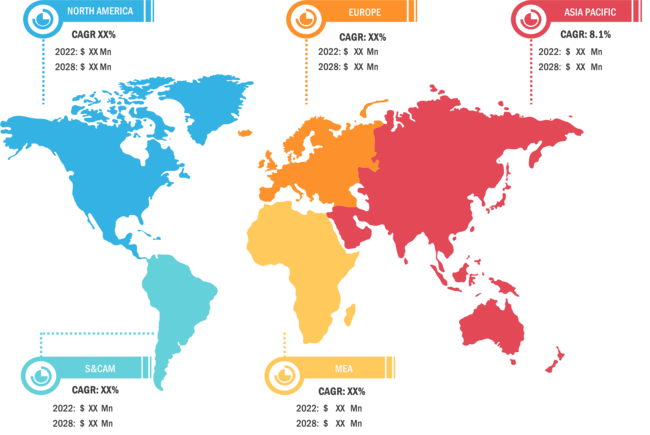IgG Segment, by Type, to Account for Largest Share in Intravenous Immunoglobulin Market During 2022–2028
According to our latest study on “Intravenous Immunoglobulin Market Forecast to 2028 – COVID-19 Impact and Global Analysis – by Type, Application, Distribution Channel, End User, and Geography” the market is expected to grow from US$ 11,206.54 million in 2021 to US$ 18,672.55 million by 2028; it is expected to grow at a CAGR of 7.6% from 2022 to 2028. The report highlights the key factors driving the market growth and prominent players with their developments in the market.
Based on the type, the intravenous immunoglobulin market is segmented into IgG, IgM, IgA, IgE, and IgD. The IgG segment is likely to account for a larger market share during the forecast period. By application, the market is segmented into hypogammaglobulinemia, chronic inflammatory demyelinating polyneuropathy, immunodeficiency diseases, myasthenia gravis, multifocal motor neuropathy, idiopathic thrombocytopenic purpura, inflammatory myopathies, specific antibody deficiency, Guillain-Barre syndrome, and others. The hypogammaglobulinemia segment held a larger market share in 2021 and is projected to continue its dominance during the forecast period. By distribution channel, the market is segmented into hospital pharmacy, retail pharmacy, and others. By end user, the market is segmented into hospitals, specialty clinics, and others. The hospitals segment held the largest market share in 2021 and is likely to continue its dominance during the forecast period.
Lucrative Regions for Intravenous Immunoglobulin Market

Intravenous Immunoglobulin Market Share and Growth by 2028
Download Free SampleIntravenous Immunoglobulin Market Forecast to 2028 - Analysis By Type (IgG, IgM, IgA, IgE, and IgD), Application (Hypogammaglobulinemia, Chronic Inflammatory Demyelinating Polyneuropathy, Immunodeficiency Diseases, Myasthenia Gravis, Multifocal Motor Neuropathy, Idiopathic Thrombocytopenic Purpura, Inflammatory Myopathies, Specific Antibody Deficiency, Guillain-Barre syndrome, and Others), Distribution Channel (Hospital Pharmacy, Retail Pharmacy, and Others), End User (Hospitals, Specialty Clinics, and Others), and Geography
Increasing Geriatric Population Drives Intravenous Immunoglobulin Market
Intravenous immunoglobulin (IVIG) is used to treat patients suffering from primary and secondary immunodeficiencies and autoimmune disorders. IVIG is a standard therapy to treat most of the primary immunodeficiencies (PID). As per the National Institute of Allergy and Infectious Diseases (NIAID), there are over 200 different types of primary immune deficiency diseases (PIDDs) affecting about 500,000 people in the US. The rare genetic diseases can be chronic, weakening, and expensive to treat. Immune Thrombocytopenia (ITP) is an autoimmune bleeding disorder characterized by abnormally low levels of platelets; a situation referred to as thrombocytopenia. As per the Rare Diseases Organization, around 200,000 ITP cases are recorded across the world annually.
As per the National Multiple Sclerosis Society study report published in 2019, around 1 million adults (about 913,925) were affected by multiple sclerosis (MS) in the US. According to the Multiple Sclerosis Society (MS Society UK), more than 130,000 people were suffering from MS in the UK in January 2020, and around 7,000 people are diagnosed with it every year. Additionally, as per the Department of Health, Australia, there are around 25,600 MS cases in Australia. IVIG is also used in the treatment of MS. Thus, increasing prevalence of immunodeficiency diseases drives the growth of the intravenous immunoglobulin market.
The outbreak of COVID-19 pandemic had a positive impact on intravenous immunoglobulin market growth. according to a case study (2020) in Neuroimmunol Neuroinflammation Journal, intravenous immunoglobulin was successfully used to treat COVID-19-associated encephalitis of a patient in India. Additionally, various studies published in PubMed and NCBI by Chinese researchers also show that IVIg has demonstrated clinical efficacy in critically ill patients with COVID-19 in reducing the rate of mortality and increasing the length of hospitalization. Since the onset of the COVID-19 pandemic, there has been a disproportionate growth in the intravenous immunoglobulin market due to fewer hospital visits by patients. However, post-COVID, there has been a high demand for IVIg owing to its efficacy in the Covid-19 treatment and immunodeficiency-related health problems that contributes to the intravenous immunoglobulin market’s future growth.
Takeda Pharmaceutical Company Limited; Grifols, S.A.; Pfizer Inc.; ADMA Biologics Inc.; Bio Products Laboratory Ltd.; Shanghai RAAS; Octapharma AG; Kedrion S.p.A; CSL Behring (CSL Limited); and Prothya Biosolutions B.V. are among the leading companies operating in the global intravenous immunoglobulin market.
Various organic and inorganic strategies are adopted by companies operating in the global intravenous immunoglobulin market. Organic strategies mainly include product launches and product approvals. Further, acquisitions, collaborations, and partnerships are among the inorganic growth strategies witnessed in the market. These growth strategies allow the market players to expand their businesses and enhance their geographic presence, thereby contributing to the overall market growth. Further, acquisition and partnership strategies help the market players in strengthening their customer base and expanding their product portfolios. A few of the significant developments by key players in the global intravenous immunoglobulin market are listed below.
- In July 2021, Prothya Biosolutions was formed by the merger of Plasma Industries Belgium with Sanquin Blood Supply Foundation. Plasma Industries Belgium (PIBe), with roots in the Belgian Red Cross, integrated with Sanquin Plasma Products (SPP), a former subsidiary of the Sanquin Blood Supply Foundation (Stichting Sanquin Bloedvoorziening).
- In April 2021, BPL and Atlantic Research Group entered into long-term collaboration. This agreement establishes ARG as BPL's preferred contract research organization (CRO) for conducting clinical research trials and providing supportive services for the company's global new product development programs. The agreement builds on BPL and ARG's previous successful collaboration on clinical trial programs.
- In March 2022, the United States Food and Drug Administration’s (“FDA”) approved to extend the expiration dating from 24 to 36 months for both its ASCENIV and BIVIgAM immune globulin (“IG”) drug product stored at 2-8°C. The expiration date extension applies to all existing ASCENIV and BIVIgAM lots currently in the commercial supply chain as well as to future production of ASCENIV and BIVIgAM in all vial sizes, production scales as well as internal and external fill-finished drug product.